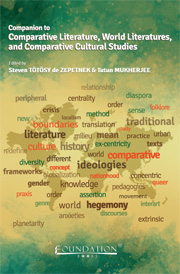Book contents
- Frontmatter
- Contents
- Introduction to the Companion to Comparative Literature, World Literatures, and Comparative Cultural Studies
- PART 1 Theories of Comparative Literature, World Literatures, and Comparative Cultural Studies
- The Contextual Study of Literature and Culture, Globalization, and Digital Humanities
- Comparative Literature and Ex-centricity
- Possibilities and Limits of Comparative Literature Today
- Comparative Cultural Studies and Pedagogy
- Teaching World Literatures
- Comparative Literature and the History of Literature
- Meltzl de Lomnitz, Comparative Literature, and Philosophy
- Comparative Cultural Studies and Cultural Anthropology
- Comparative Literature and Interart Studies
- Gender and Genre in Comparative Literature and (Comparative) Cultural Studies
- Comparative Cultural Studies and Translation Studies
- Comparative Cultural Studies and the Study of Medieval Literature
- Comparative Cultural Studies and Linguistic Hybridities in Literature
- Comparison and Postcoloniality
- (Inter)mediality and the Study of Literature
- PART 2 Comparative Literature in World Languages
- PART 3 Examples of New Work in Comparative Literature, World Literatures, and Comparative Cultural Studies
- PART 4 Multilingual Bibliography of Books in Comparative Literature, World Literatures, and Comparative Cultural Studies
- Index
Comparative Cultural Studies and Translation Studies
from PART 1 - Theories of Comparative Literature, World Literatures, and Comparative Cultural Studies
Published online by Cambridge University Press: 05 April 2014
- Frontmatter
- Contents
- Introduction to the Companion to Comparative Literature, World Literatures, and Comparative Cultural Studies
- PART 1 Theories of Comparative Literature, World Literatures, and Comparative Cultural Studies
- The Contextual Study of Literature and Culture, Globalization, and Digital Humanities
- Comparative Literature and Ex-centricity
- Possibilities and Limits of Comparative Literature Today
- Comparative Cultural Studies and Pedagogy
- Teaching World Literatures
- Comparative Literature and the History of Literature
- Meltzl de Lomnitz, Comparative Literature, and Philosophy
- Comparative Cultural Studies and Cultural Anthropology
- Comparative Literature and Interart Studies
- Gender and Genre in Comparative Literature and (Comparative) Cultural Studies
- Comparative Cultural Studies and Translation Studies
- Comparative Cultural Studies and the Study of Medieval Literature
- Comparative Cultural Studies and Linguistic Hybridities in Literature
- Comparison and Postcoloniality
- (Inter)mediality and the Study of Literature
- PART 2 Comparative Literature in World Languages
- PART 3 Examples of New Work in Comparative Literature, World Literatures, and Comparative Cultural Studies
- PART 4 Multilingual Bibliography of Books in Comparative Literature, World Literatures, and Comparative Cultural Studies
- Index
Summary
Abstract: In his article “Comparative Cultural Studies and Translation Studies” Paolo Bartoloni discusses the interstitial space of translation by drawing on literary and philosophical preoccupations, especially Giorgio Agamben's notion of “potentiality.” Bartoloni proposes that the defintion and discussion of “potentiality” and the significance it represents ought to pass through a rethinking of translation studies, and asks what would happen if the focus of translation shifts from the final product—or from the relation between the source text and the translation—to the process of translating where distinct languages and cultures meet without superimposing own values onto the other. Bartoloni postulates that this process achieves relevance when located within a cultural dialogue from which a new reflection on translation, as well as literature and subjectivity can commence.
Introduction
Interpreting Aristotle's Book Theta of the Metaphysics, Giorgio Agamben remarks that “in its originary structure, dynamis, potentiality, maintains itself in relation to its own privation, its own steresis, its own non-Being. This relation constitutes the essence of potentiality. To be potential means: to be one's own lack, to be in relation to one's own incapacity. Beings that exist in the mode of potentiality are capable of their own impotentiality; and only in this way do they become potential. They can be because they are in relation to their own non-Being. In potentiality, sensation is in relation to anesthesia, knowledge to ignorance, vision to darkness” (Potentialities 182; further on Agamben and translation, see Bartoloni).
- Type
- Chapter
- Information
- Companion to Comparative Literature, World Literatures, and Comparative Cultural Studies , pp. 148 - 161Publisher: Foundation BooksPrint publication year: 2014

